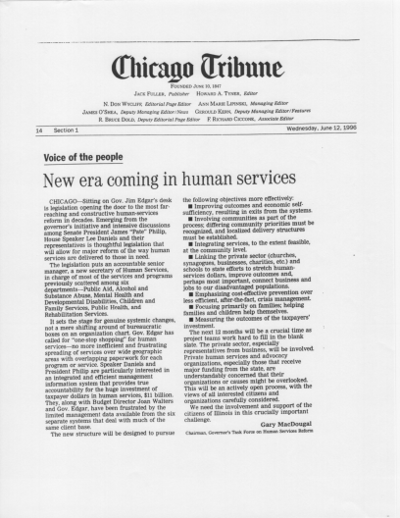Chicago Tribune
6/12/1996
By Gary MacDougal, Chairman, Governor's Task Force on Human Services Reform.

CHICAGO — Sitting on Gov. Jim Edgar's desk is legislation opening the door to the most far-reaching and constructive human-services reform in decades. Emerging from the governor's initiative and intensive discussions among Senate President James "Pate" Philip, House Speaker Lee Daniels and their representatives is thoughtful legislation that will allow for major reform of the way human services are delivered to those in need.
The legislation puts an accountable senior manager, a new secretary of Human Services, in charge of most of the services and programs previously scattered among six departments--Public Aid, Alcohol and Substance Abuse, Mental Health and Developmental Disabilities, Children and Family Services, Public Health, and Rehabilitation Services.
It sets the stage for genuine systemic changes, not a mere shifting around of bureaucratic boxes on an organization chart. Gov. Edgar has called for "one-stop shopping" for human services--no more inefficient and frustrating spreading of services over wide geographic areas with overlapping paperwork for each program or service. Speaker Daniels and President Philip are particularly interested in an integrated and efficient management information system that provides true accountability for the huge investment of taxpayer dollars in human services, $11 billion. They, along with Budget Director Joan Walters and Gov. Edgar, have been frustrated by the limited management data available from the six separate systems that deal with much of the same client base.
The new structure will be designed to pursue the following objectives more effectively:
- Improving outcomes and economic self-sufficiency, resulting in exits from the systems.
- Involving communities as part of the process; differing community priorities must be recognized, and localized delivery structures must be established.
- Integrating services, to the extent feasible, at the community level.
- Linking the private sector (churches, synagogues, businesses, charities, etc.) and schools to state efforts to stretch human-services dollars, improve outcomes and, perhaps most important, connect business and jobs to our disadvantaged populations.
- Emphasizing cost-effective prevention over less efficient, after-the-fact, crisis management.
- Focusing primarily on families; helping families and children help themselves.
- Measuring the outcomes of the taxpayers' investment.
The next 12 months will be a crucial time as project teams work hard to fill in the blank slate. The private sector, especially representatives from business, will be involved. Private human services and advocacy organizations, especially those that receive major funding from the state, are understandably concerned that their organizations or causes might be overlooked. This will be an actively open process, with the views of all interested citizens and organizations carefully considered.
We need the involvement and support of the citizens of Illinois in this crucially important challenge.